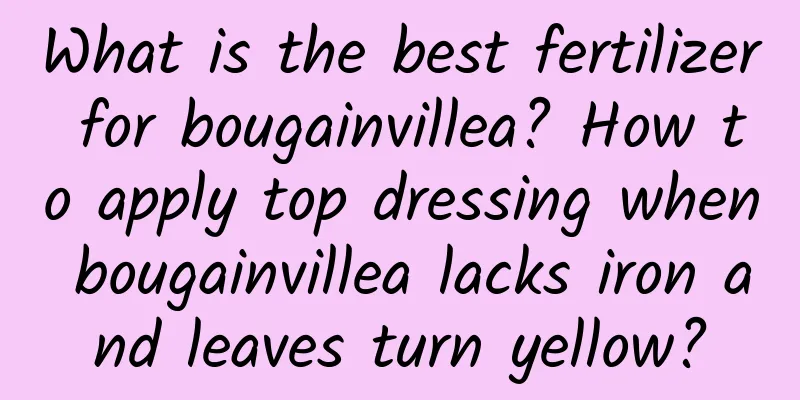What is the best fertilizer for bougainvillea? How to apply top dressing when bougainvillea lacks iron and leaves turn yellow?

|
Although bougainvillea is a shrub, it is also very beautiful when it grows. It usually grows in clusters of three, with various colors, such as bright red and purple. They look like petals, but they are actually leaves. Fertilization will also affect the color of these bracts. So what fertilizer should be applied to bougainvillea? What fertilizer is best for bougainvilleaFertilizer elements should be balanced. Although bougainvillea is a shrub and nitrogen fertilizer promotes leaf growth, bougainvillea leaves are different from those of other plants and need color. This requires higher phosphorus and potassium fertilizers. For example, liquid fertilizers made from chicken manure, fish and shrimp, compound fertilizers, potassium dihydrogen phosphate, etc. Fertilization method: Whether in the pot or in the field, sufficient base fertilizer must be applied. The base fertilizer for potted plants can be bone meal, egg shells, chicken manure, etc. Chemical fertilizers cannot be used as base fertilizers. Apply thin fertilizers frequently and combine them with topdressing. Spring, summer and autumn are the peak growth periods of Bougainvillea. The interval is about half a month, and fertilizer and water are applied once. For potted bougainvillea, it is best to apply topdressing after the pot soil is dry, and do not apply topdressing when the pot soil is too wet. In the hot summer, in order to reduce the number of topdressing times, fertilization should be stopped during the dormant period of bougainvillea in winter. The best time is a sunny morning, not noon. In spring, potassium dihydrogen phosphate can be sprayed on bougainvillea once a week for three weeks. The proportion can be operated according to the instructions. How to apply fertilizer when bougainvillea has yellow leaves due to iron deficiency1. Go to the flower market and buy a small package of ferrous sulfate and use it according to the instructions. The premise is that you have a mixed flower-viewing nutrient solution in use at home. 2. If you don't have any fertilizer at home, it is recommended to buy organic nutrient solution containing fulvic acid, humus, macroelements and trace elements. Don't buy pure chemical fertilizers for cheap, which can burn the roots of plants and make the soil hard. Just dilute it with water according to the instructions. 3. Buy a bag of organic compound fertilizer (containing fulvic acid, humus, macroelements, and trace elements) for family use, which is in granular form. Usage: When the soil of the flowers is semi-wet, use chopsticks to evenly poke 5-8 holes along the edge of the pot, with the depth about the root position. Place about 10 granular fertilizers in each hole, bury the soil holes, and irrigate thoroughly. Use once a month. What are the symptoms of plant deficiency?1. Nitrogen deficiency.The plant is thin, with small leaves that are yellow or even dry. The stems are thin and cracked, and the flowers are sparse. 2. Phosphorus deficiency.The leaves are dark green and grow slowly. The veins of the lower leaves turn yellow, often with a purple tint, especially on the petioles. The leaves fall off early, the flowers are small and few, the flower color is poor, and the fruits are poorly developed. 3. Potassium deficiency.The lower leaves have spots, and the tips and edges of the leaves often die. The yellowing part spreads from the edge to the middle, and then the edge turns brown and shrinks downward, and finally the lower leaves and old leaves fall off. 4. Magnesium deficiency.The lower leaves turn yellow, and dead spots often appear in the late stage. Yellowing appears between the leaf veins, which are still green. The leaf edges bend upward or downward to form wrinkles, and dead spots often appear between the leaf veins within a day. 5. Calcium deficiency.The tips and edges of young leaves rot, and the tips of young leaves often become hooked. The roots die before symptoms appear, and the terminal buds usually die. 6. Iron deficiency.The disease occurs on new leaves, with yellowing between veins, while veins remain green; lesions are rare. In severe cases, the leaf edges and tips dry up, sometimes expanding inwards to form a larger area, with only the larger veins remaining green. 7. Manganese deficiency.Usually occurs on new leaves, which are still green, often with tiny spots, which are distributed over the entire leaf surface, forming a fine net. The flowers are small and the color is poor. |
>>: What kind of soil is good for gardenias? How can gardenias survive?
Recommend
What causes breast pain?
Many girls do not pay enough attention to breast ...
What are the methods of using loofah to promote lactation?
Luffa has a good effect on promoting lactation, b...
How does a tiny virus with a diameter of less than 120 nanometers carry out its "T cell attack plan" in the human body?
On June 5, 1981, the U.S. Centers for Disease Con...
Irritability, insomnia, thick neck, and extreme craving for food, many people don’t know they are sick
I want to eat all day long. I ate a lot, but lost...
Brown discharge while pregnant
When pregnant, her secretions will increase, and ...
Why is there pain when pressing the uterus?
When we have gynecological inflammation, some phy...
Junior high school girls long hair
When girls are in junior high school, they are al...
Is eating motherwort effective for amenorrhea?
Some people with amenorrhea will see actual effec...
Sexual psychological characteristics of female adolescents
Many women will encounter some sexual psychologic...
If you have 4 symptoms after a meal, beware of pancreatic cancer! Especially for this type of people
The pancreas Compared with the heart, liver, sple...
Pain in the genitals and anus
Anal prolapse is a kind of discomfort disease tha...
I hope you don’t have any of these habits that cause constipation…
Expert of this article: Zhao Weitong, attending p...
How to treat frequent urination in women?
There are many ways to treat frequent urination i...
How many days of pregnancy can be detected with a pregnancy test stick
For women who are preparing for pregnancy, they r...
Why do girls often have cramps in their toes?
Many girls say that their toes often cramp. What&...









